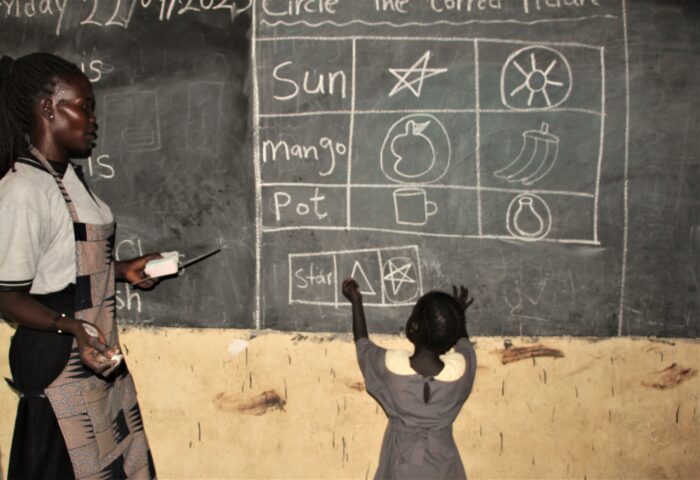When a passion becomes a career!
October 5, 2023 10:07 amAbout 100 metres off a main road in the outskirts of Juba, you will find semi-permanent buildings in what is both a residential and commercial area of the city. In the distance, you can hear faint voices of children singing. The voices grow louder and clearer as you get to the gate leading into a school compound.
Betty Michael is the teacher leading the children in song. Betty has beads of sweat on her face from dancing with the children. Her class contains over 30 children, ranging from four-year-olds to six-year-olds.
Dressed in a grey t-shirt, and black skirt, she also wears an apron, almost looking like a chef. When we query Betty about the apron, she explains: “The children are always touching me, when they need something, when I am explaining something to them, even when I am seated, they are all over me and without the apron, I am a mess at the end of the day”.

Teacher Betty attending to children in the class
Betty has been teaching at Pearl Group of Schools, Nursery and Primary School since 2019, but she has been a teacher for over 10 years. “I have been teaching here for the past five years but I have been a teacher for over ten years. Teaching is all I have done from the time I dropped out of school,” Betty adds. Like many, as a child, Betty dropped out of school due to financial challenges.
Betty’s passion and commitment is visible, but Betty is not a trained teacher! “I am not a trained teacher. Recently, I completed my secondary education through the GESS Accelerated Secondary Education Programme (ASEP), which is meant for teachers who need to complete secondary education. Now I can enrol to a teacher training institute if I like, and I will become a professional teacher. I am thinking about that,” Betty adds.

Teacher Betty looking at her Secondary Four Completion Certificate
Today is World Teachers’ Day and the theme for this year is: “The teachers we need for the education we want: The global imperative to reverse the teacher shortage”. This theme is more relevant than ever, considering the shortage of trained teachers in South Sudan, and around the world. The few trained teachers in South Sudan find alternative jobs in other sectors due to the low and irregular pay to teachers. This is as low as $10 per month for some teachers. GESS continues to support the Ministry of General Education and Instruction (MoGEI) to ensure teachers’ salaries are prioritised and paid timely.
One of the primary reasons for the number of untrained teachers in South Sudan is the financial barrier. You will find many secondary school dropouts working as primary school teachers across the country. “I am the Deputy Head Teacher in this school, but I am not a trained teacher. It is my experience, passion and commitment that has made me to progress to this role. I know friends who dropped out of school and could not complete secondary education like me, but they are teaching. They could benefit from the ASEP programme,” Agnes, Deputy Head Teacher, Pearl Group of Schools, Juba. “The ASEP programme is like a gateway to progress for any teacher who wants to advance their career,” Mary adds.
“When I started teaching, I didn’t know much, I didn’t know how to make a lesson plan but now after completing the programme, I know better. I interact better with the children, and most importantly, I now have the certificate to enrol to a higher institution so that I can become a professional,” Betty resounds.
“My best moments are when the children understand what I teach them. The children in my class are of different ages, so I have to be innovative enough to make them understand equally. Also teaching is learning. I learn every day and I love teaching. I would love to continue teaching but the government needs to do something about the pay to teachers,” Betty concluded with a smile on her face.

Teacher Betty and one of her learners in the class
GESS currently operates 51 ASEP centres across South Sudan with over 2,100 learners registered. Loke Justine, the Alternative Education Systems Adviser for GESS had this to say; “We have started receiving testimonies of improvement in lesson delivery amongst teachers at the ASEP centres. The learner-centred approach is one thing they speak about that they now apply in their own teaching methods. They are doing better than before they enrolled for the ASEP programme”. The ASEP programme is provided at no cost to all the teachers who enrol.
With programmes like the ASEP, we can have “The teachers we need for the education we want”.
Categorised in: Girls' Education, Quality Education
Comments are closed here.